Opinion
Kya kuchh tha jiske kehne ko: A tribute to father
Published
2 years agoon
By
BK Editor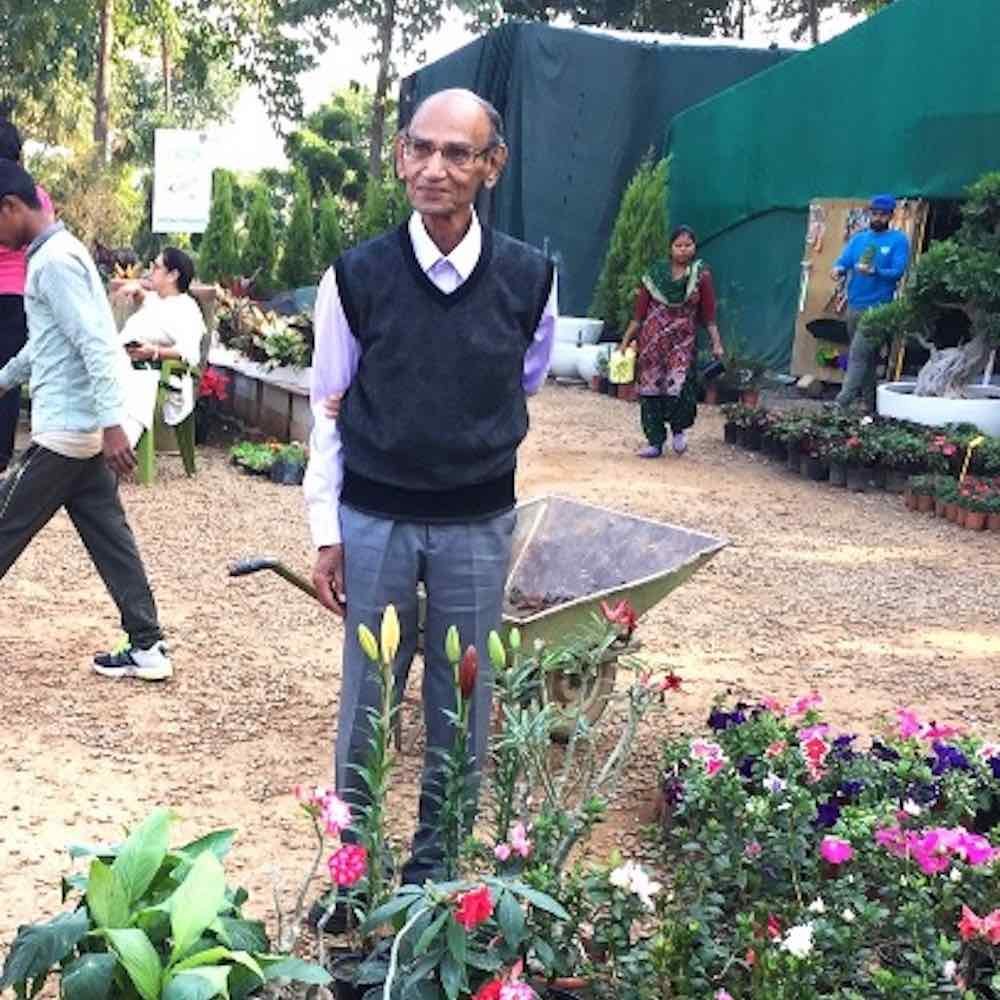
By Zeeba Zaka-ur-Rab
کیا کچھ تھا جس کے کہنے کو
Kya kuchh thaa jiske kehne ko
وہ کہنے والا چلا گیا
Vo kehne vaala chala gaya 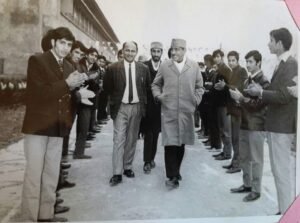

سالہا – سال سہا جس نے
Saalha saal saha jisne
وہ سہنے والا چلا گیا
Vo sehne vaala chala gaya
الجھے – سلجھے خیالات لیے
Uljhe – suljhe kHayalaat liye
چپ رہنے والا چلا گیا
Chup rehne vaala chala gaya
With the reality of his having gone away from this world, still to sink in fully despite the passage of four full months, it is with much hesitation as well as with a rather heavy heart that, a daughter brings herself to prefix “late” to her father’s name, and attempts to pay homage to this noble soul today.
Born as the fourth and the youngest child into a reputable, erudite and affluent family of Amroha, a town in western Uttar Pradesh, Abba (our father), Late Prof. Mohammad Zaka-ur-Rab was one of his kind – a thorough gentleman, a man of uncompromising principles, an intellectual par excellence (who was) far ahead of his times,.. and a multifaceted, ineffably wondrous personality. With humility, soft-spokenness and exemplary Husn-e-Akhlaaq (courtesy, politeness and affability ) as hallmarks, the tremendous amount of sabr (patience) this noble and pious soul was endowed with, is beyond incredible. Abba’s grandfather, Janab Abdur Rab, a highly respected Taluqdar of Amroha, had also served as a Judicial officer of the Royal Court at various places in the erstwhile Rajputana region. This highly acclaimed and principled officer, was also a renowned Persian scholar of his times. Abba’s father, Janab Mohammad Zia-ur-Rab, was one of the only two Deputy Directors of Industries for the entire United Province ( the mother of a much smaller Uttar Pradesh of post-independence era). It is heartening to hear people still refer to him as the most kind and upright Officer Kanpur has ever had. Not the ones to buckle under any pressures, both these righteous great men always stood up for the truth. Underneath their tough exterior, however, nested a soft, sensitive and compassionate heart. Being extremely close to these two great men in the family, their lives and values left an indelible imprint on my father’s personality. It was actually his grandfather who had inducted the habit of rising early and awakened, in him, the love for books and nature, ..habits which Abba retained life -long, and later remembered to pass on to his own children. “Zuka” his grandfather would call out lovingly, at 4 o’ clock in the morning, and slipping tiny little feet into his slippers, Abba would rush to meet him. The two of them, would then set out for a refreshing long walk in their orchards, breathing in the fresh air, enjoying stories and anecdotes with merry chirps of birds as background melody, and discussing important lessons on life, faith, and nature which were to guide him all through his life. A straightforward and extremely benevolent person himself, Abba, later proceeded to nurture in us, as well, the virtues of truthfulness, selflessness, punctuality, impartiality, perseverance, and humility etc. etc right from our childhood. “Fear no one but the Almighty …and the Day of Judgement” …he would remind us frequently,…and as we strolled in the garden, with the morning dew caressing our little feet or rested on the terrace gazing at shiny stars at night, he would, in an effort to ignite the young researcher in us, often say “Learn to observe.. ‘Ghaur karo’ .. Allah himself has commanded”……
Having lost his father, while his intermediate examinations were underway (and his grandfather even earlier), he learned to endure adversity with great poise and fortitude at a fairly young age. Deeply attached as he was to his father, Abba a very bright and meritorious student all through, did not let the tragedy affect his educational excellence or achievements. Going against the wishes of most relatives and family friends, who, at that time, advised him to skip (the exams), he decided to do what his father would have wanted him to, that is …write the exams and silence them all with his results. So, each morning the very young and grieving Zaka would leave for the graveyard, offer fateha (prayer) and sit crying by his beloved father’s grave,… and when it was time to leave, the broken-hearted child would pull himself together, and seeking his departed fathers blessings, proceed to the examination centre. Abba used to often narrate, in a voice choked with emotion and a sense of great respect and immense gratitude still palpable, how his teachers from B.N.S.D. Inter College (where he used to study in Kanpur), would specially care to come to the examination Centre, which was some 5 kilometres away from their college, only to place their hands on his head, wish him luck, and comfort him saying “Though your father is no more…Don’t for a moment feel that you are alone…Beta (son), we were there for you,” ..These kind and much needed words for a child in that state, remained deeply etched in his mind, and Abba continued to remain truly indebted to his teachers, holding them all in high esteem throughout his life. To this day, his words stressing respect for teachers resound in our ears “A teacher must never be disrespected..( for ) anyone who does so, earns nothing but humiliation and disgrace in his life)..”… “The one standing between the table and the blackboard should be listened to with rapt attention, (because) howsoever little one may think he/she knows,.. he definitely knows more than the student”…and “Observe your teachers carefully, .. Resolve never to repeat ( yourself) if ever you find something disapproving ,.. but try to do even better whatever you find good (in them)…”
A tireless worker, Abba knew no shortcuts. His analytical mind, scientific approach and a keen eye for details made research come almost naturally to him. From a young age, a passion for education and progressive thinking was fired and fuelled by his mother, Syyeda Begum, an enlightened homemaker who, herself, had received only informal education by a lady tutor, especially, hired by her father to impart English lessons at home. “Wo ilm hi kya, jo dil-o-dimagh roshan na karey ! (what use is education which fails to enlighten the heart and soul)” he would fondly recall his mother say. Armed with an insubvertible zest for knowledge, which lasted his lifetime, and an amazingly unparalleled knack for simplifying tough topics, Abba turned out to be a fabulous and popular teacher himself… one, who could teach just any subject or topic, to anyone, with great ease. It is difficult to fathom or forget how he could make easy for us, complexities of even medical subjects during our graduation and post-graduation days!.. His succinct hand written notes, meant for a quick revision before our MBBS, MD/ MS examinations, and later even for job interviews are preserved with us to this day.
Prof. Abdul Hameed Hakeem Sb. has penned a well-deserved, beautiful and fairly exhaustive tribute titled “The pioneer of agricultural education and extension in Kashmir,” highlighting our father’s many qualities and contributions ( Editorial page, Greater Kashmir, November 24, 2023). Each line, in this article, is so true, and each fact so well-articulated and elucidated, that (reading) it, literally, took our entire family down the memory lane, bringing back memories so vivid and pleasant of our wonderful early childhood in Wadoora…. A life filled with plentiful laughter and gay abandon in the breathtakingly beautiful, fragrant and picturesque landscape surrounded, on all sides, by blue snowcapped mountains….. the imposing house with wooden floors and sloping roofs standing tall, its walls covered elegantly with luxuriant dark green ivy creeper playing a loyal nanny to generations of little birds, (with) its shiny broad leaves and maze of strong tendrils sheltering their nests and eggs from predators, ….the aesthetic lush green lawns and idyllic gardens laid and nurtured painstakingly by Abba…. A life amidst vibrant flowers, delicious fruits and berries, exotic vegetables, and also pets aplenty,… ranging from hens and chicks, nightingales, doves, partridges, Japanese quails to even insect larvae… each of which, could boast of a unique name of its own, depending on a characteristic that had managed to catch the children’s watchful eyes.. Tick–tika was one such name, given to a fat, fluorescent green larva which constantly produced ticking sounds while nibbling away, ravenously, at fresh piles of tender leaves which our mother introduced, dutifully, in its jar every morning …whereas Kudki was a broody dusky grey hen, which went “kuduk kuduk”, pecking merrily around on insects, young frogs and seeds.. and, yes, frogs,…how could I forget those creepy creatures !?…there were hundreds of them there, ready to scare the life out of me!… a fear, which my other two sisters, enjoyed to cruelly exploit to the hilt, …chasing me around the house with the little four legged monsters on their badminton racquets …poised to leap (at me), … in a get, set, and go position…! Horrified, I used to refuse to step out, and it was Abba who always came to my rescue … “Meri beti ko koi tang nahi karega (no one should trouble my daughter)” he gently rebuked my sisters, and ensured the jumpy menace was gathered in baskets from the lawns, and tossed gently across the fence.
Abba, was, in fact, the first non-state subject to have been made permanent in his J& K service…a fact which surprises many. The article by Prof. Hakeem also brought alive the joy, warmth and PRIDE of being ABBA’s three little daughters. A myriad scenes began to play, before our eyes, …. the radiant glow regularly lighting up our parents’ faces as they saw the college grow and achieve milestone after milestone, and its products attain greater and greater heights … glimpses of the happiness and contentment on his face as Abba scanned our school report cards, and heard from my mother the feedback from our teachers ……flashes of Abba, (with) his back resting against the headboard of the bed, a cup of piping hot coffee in his left hand, giving dictations for his research papers etc. to Ammi, our mother, who doubled as his stenographer at home, and whose valuable inputs and suggestions Abba always welcomed … Also came rushing in, recollections of how we would see him off each morning, even proceeding to clamber up the tall wooden main gate, in an effort to keep watching him as long as we could, ….and then as evenings drew near, perched atop branches of Albizia trees, covered in fuzzy baby pink blooms, lining the driveway, we waited eagerly for him to return. Years later, as if in reciprocation, even after his frame had been rendered frail by age, Abba would still stress on seeing us off daily at the main gate, …where he would continue to stand and watch, until the disappearance of the rear of our car into the next lane. Fast forwarding to the present, with his going away forever, that wait (for our Abba), albeit extremely heart-breaking and unending this time, has just begun for us all over again …!
Although most of the crops and trees, Abba got planted in Wadoora, do find a mention in the article by Prof. Hakeem, I would like to add a few more which our family could recollect. It was common in those times, for heavy snowing or landslides to cut the valley off from the rest of the country for weeks or months together. A man of great foresight, energy and grit, Abba wished to see the valley become self-sufficient in sugar production. This thought led him to introduce the plantation of sugar beet as well as sweet sorghum, from both of which, sugar could be processed just like from sugarcane,.. but at a much lesser expense. Additionally, these two crops could yield animal fodder as well as ethanol. He had also conceived the idea of setting up a Gobar gas plant in the College, to recycle waste from the dairy, for the production of biogas, a clean, unpolluted and cheap source of fuel in rural settings. Abba was also the one to have introduced orange trees which, till then, had not been planted or seen to bear fruits ever before in the valley. On either side of the path to the college, he had got silver poplar trees planted. The avenue of these eloquent trees, with their silver leaves shimmering in the sunlight like wings of little fairies, was a sight to behold…
I would specially like to recount here, an interesting anecdote around sugar beet, which some of his colleagues or students might still be able to recall. Winters were approaching fast, and sugar beet was still awaiting transplantation. With snowing just around the corner, and an unexpected strike by Maalis (gardeners) of the College, Abba was left very very worried. “Pray beta … pray that, whatever you Abba wishes for, gets to happen today ”.. Ammi urged us, in a visibly worried voice, without disclosing any further details to the younger two of her daughters. Aapa, the eldest, the most serious of her daughters(though not much older than us) who was treated by Ammi as her confidante and friend all along, was, however, often privy to many tensions or problems about which the younger two of us could only have a vague idea at best. “ I will plant them by myself today … can’t see all of them perish.. at least a few might be saved” Abba thought out aloud, as he started to transplant the sugar beet with his own bare hands… Seeing their college Principal work in the field, ..the staff members, rolling back their sleeves and pants, joined in too…and soon enough, the entire college, including students, had pitched in… It seemed Allah had answered our innocent prayers, and within no time the entire work was done…That day, “Saathi hath bhadana ” a popular Mohd. Rafi song from an old and famous Hindi Classic “Naya Daur” seemed to have been re-enacted, albeit in a refreshingly new way, in the fields of this beautiful college, tucked away in a remote village of the valley of Kashmir,… and as if in celebration of the team work and spirit, .. a fine drizzle soon followed the planting of the last row. ….The next day, a thick blanket of snow had descended all over the campus.
How much this college actually meant to Abba, can be gauged by another incident, from several years ago, which Ammi often recounts. It was the winter of 1971 when the valley saw itself embroiled in yet another Indo-Pak war. Even though almost all other families had moved to safer zones, our father refused to leave the campus, a decision backed fully by our mother. When some colleagues tried to convince him to shift out as well, he retorted calmly “ Does that place have a different and more powerful Allah from the one we have with us here!?”.. One particularly chilly night, our house, standing lone in the darkness, was shaken violently with an ear shattering, loud boom, seemingly from bombardment in some place quite near… Abba rushed out of the house crying out in despair “they have destroyed my college… sab tabah kar diya”…Ammi had to literally run out and pull him back in pleading “ if , God forbid, it has already happened,..is your rushing there at this hour, .. in the dead of the night, going change any of it??”
Coming back to the obituary by Prof. Hameed Sb., not only were we greatly overwhelmed and deeply moved by his article, but also felt extremely indebted to him for having, diligently and honestly, put on record, for the world to know, … who Abba was, …what a remarkable foresight he possessed,.. and all that he had managed to do, way back then, for a college he was so completely dedicated to….However, at the same time, unbeknown to Hameed Sb., another thing which the article also ended up doing, unintentionally, was to uncover some old sores as well. Wounds, which still oozed and bled somewhere deep down within our hearts…and which over the years, even we had convinced ourselves to believe, ceased to exist…A pall of impenetrable silence and gloom seemed to descend on Ammi and the three daughters who Abba had left behind … During the entire day, we could not help feeling that long forgotten pain and the same anguish all over again … That particular night, none of us could catch any sleep… and as I lay awake, staring at the ceiling, I felt compelled to write my own tribute and elegy to a father like none other in this world ..a father, who instead of admonishing his daughters, himself proceeded to teach them to climb trees, offering in the process, his own palms to step on… A father, who in a bid to empower his daughters and decrease their dependence on others, not only taught them to send telegrams, withdraw and deposit money, fill admission forms themselves (from a pretty early age), but also trained them to change tyres before teaching them to drive!…A father, who instead of imposing his own wishes or restrictions, opened up the skies in all their entirety for them (as far as his resources could permit).. A father, who, howsoever tired or tense he was , always entered his home with a warm smile on his radiant face,.. and cared to keep up his promise of playing badminton with each of his little daughters… A father, who despite his hectic schedule, not only wrote timely replies to his children, but always cared to enclose (within the same envelope or inland letter), the original letters addressed to him as well, appending little notes in his trademark neat and mature hand…Notes, appreciating their tender sentiments, but at the same time, guiding them, gently, on how a particular sentence could be framed better… or an alternative word or expression used….
Abba not only had great command over both English and Urdu, but he could also speak Persian with great elan. His DSc. (Doctor of Science – a degree higher standing than Doctor of Philosophy [PhD]) thesis won remarkably strong words of praise from highly acclaimed foreign experts, not just for the exceptionally high quality of his research, but also for the linguistic beauty of expression as well as for the exquisite diagrams which he had himself inked. Not many in Kashmir might, however, be aware that Abba, who was a very fine and sensitive artist at heart, wrote beautiful poetry as well. A great admirer of art and handicrafts, he never let my mother bargain. Siding always with the seller, he would convince her “ they work so hard all year long, ..why eat into the little profit they wish to make!”
Just like at any other place, life in Wadoora, too was peppered with small worries and tensions. However, despite the usual ups and downs, faced by almost all office goers, broadly speaking, Abba and his small family of five, were happy and contented. Life was fine, until one day, when suddenly like a bolt from the blue, some fairly, unsavoury events were orchestrated by a few people with nefarious designs and vested interests. Not the one to bow down to pressure or injustice, Abba decided to proceed on a long leave and left for Aligarh. Those unfortunate events, left us terribly terribly hurt and shaken. Our honest, soft- hearted, and sensitive parents were the hardest hit. It, definitely, wasn’t a question of any post or promotion having been denied…(Abba was the last one to have run after position, power, money or fame).. The sorrow and hurt, were all about a doubt having been cast on the impeccable integrity of a person as scrupulously honest and hardworking as him,.. about having been let down by his own … about having had to go far- far away from where his heart always lay and continued to ( lay) till the very end of his life and…last but nt the least, an illustrious innings having been undeservingly cut short…..
Quiet and uncomplaining , Abba, an epitome of “sabr,” never once complained to Allah or cursed anyone. Seldom expressing any frustration or pain, he chose to use a dignified silence as his armour instead. However, we, as his family, could still sense it all. Although we all tried to put up a brave front before each other, the harsh reality was that, each member of our family was impacted in ways more than one… the temporary, but severe financial hardship, was just one of the many consequences. Though he came from a rather well-off family, complete immersal in affairs of the college had left Abba with little time to devote to his ancestral property. This inattention, later, cost us dear,.. and before we could realize it, almost everything including his house, orchards, and other land holdings in his hometown, had been usurped by caretakers as well as outsiders. Ammi who, from the beginning, multitasked as an efficient homemaker, loyal friend, and a competent research and personal assistant to her husband (at home), continued to stand steadfast, uncomplainingly, with him through thick and thin … the unimaginably strong bond of absolute trust, care and affection they shared mutually, all their lives, is an example for all…Our parents (who were first cousins) shared many qualities and virues and remained totally inseparable and wholly devoted (to each other) till the very end..
In the ensuing years, Abba a picture of grace, indefatigable and indomitable spirit, and complete faith in the Creator, managed to veer us through all the turbulent and fairly difficult times with dignity and composure. “Have unquestioning faith in him( the Almighty)… uski rassi mazbooti se pakde rakkho..aur uski raza mein raazi raho”…he would remind us pointing at the sky. “Ye kya hai (what is this)!?… Zinda ho beti, tou zindo ki tarah jeena seekho… Learn to live your life with zest and zeal…” he would gently chide, whenever he saw any of his daughters pull on a long face… To pep our sulking spirits up, he would reiterate “Waqt kii sabse baDii Khoobi hai ke guzar jaata hai,.. achha bhi or bura bhi (The greatest beauty of time is that it passes, …both good as well as bad,” …and in the due course of time, we really got to see it happen, when, by Allah’s grace and our family’s resilience, we succeeded in overcoming the transient hardships….What could never be undone, however, was the tragic loss of, what could have been, some of the most productive years of life of this young, enthusiastic, and honest researcher and administrator. Looking back at all that Abba had managed to painstakingly accomplish during his tenure as Principal at Agriculture College, Wadoora, and knowing what his calibre was, …it pains us greatly to realise how much more he could have contributed, had all the dreams and plans (which) he had envisaged for the future development of his college, not been dashed so abruptly ..and so ruthlessly many many years ago by a few self-seeking men, …some of whom later went on to personally apologise to Abba, accepting and repenting the immense and irreversible damage (they had) caused to a person as honest and sincere as him …
After leaving the Agriculture College at Wadoora, Abba was conferred the prestigious National Fellowship by the UGC which gave him the opportunity to conduct research in the Department of Zoology at AMU, of which he was an Alumnus. He also briefly served as a Professor of Entomology at the University of Benghazi in Libya. It was during this time that America attacked that country, leading us to plead with him to return. Abba eventually retired from SKUAST – Kashmir as Professor cum Chief Scientist before joining the Institute of Agriculture at Aligarh Muslim University as Director. However, despite all that he accomplished in life, Abba sometimes, still rued the unrealised dreams he had for ‘his’ College in Kashmir. Even after the passage of so many years, Agriculture College Wadoora still remained ( and shall always continue to remain) “The College” for our entire family! There is yet another precious dream which, now, shall sadly remain unfulfilled forever, … that of taking our parents on a visit to Kashmir, getting them to meet everyone, and see one more time “our” house and “Abba’s college” in Wadoora..“ Hazaron khwaahishein aisii …”
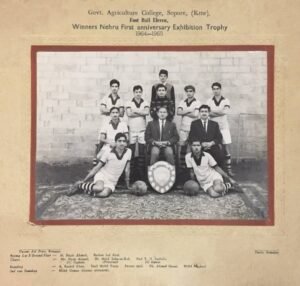

Abba with his college football team (1964-65)
Notwithstanding, all the trials and tribulations he was undeservingly and unfairingly subjected to, Abba harboured no bitterness or ill will towards anyone,.. his pious heart having only prayers, sincere words of advice and good wishes for one and all…a truth, we as his daughters, can vouch for …
I have (ignoring my rather limited proficiency in vocabulary and expression) attempted to pen down some thoughts and questions (on those ‘unfortunate events’ of Wadoora referred to in the preceding paragraphs) which, I felt, might have played, sometimes, on Abba’s mind. Since, words in any given language may have more than one connotation, I have tried to mention, at places, the relevant context of their use:
کیوں چھین ہَزارَہ مالی سے (hazaara: a pot for sprinkling water on plants)
Kyun chheen hazaara maali se
رخ باد سباء نے موڑ لیا ؟
RukH baad-e-saba ne moD liyaa?
گلشن میں جس جاں بستی
Jaa(n) basti, jis Gulshan mein
کیوں خاموشی کو اوڈھ لیا؟
Kyun kHamoshi ko oDh liyaa?
گل خاروں مین تبدیل ہوئے (kHaaron: thorns)
Gul kHaaron mei(n) tabdeel huey
بلبل نے نَغْمَہ چھوڑ دیا
Bulbul ne nagHma chhoDh diyaa
تھا عِلْم وَہاں چَھلْک تا جو
Jo chhalkaata, tha ilm vahaa(n)
!پَیمانَہ ہی وہ توڑ دِیا
Paimaana hi vo toD diyaa !
ماںجھی کے سب پتوار لیے
Maanjhi ke sab patwaar liye
طو فاں کی جانب موڑ دیا
Toofa(n) ki jaanib moD diyaa
کیا-کیا کرنے کی خاہش تھی
Kya-kya karne ki kHaahish thii
نے سپنا توڑ دیا بَیری (Bairi:one who bears a grudge; adversary)
Bairi ne sapna toD diyaa
نہ جانے کیسی رنجش تھی
Na jaane kaisi ranjish thii 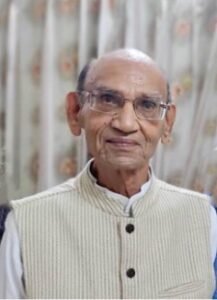

یوں رسوا کھالی چھوڑ دیا
Yoo(n) rusva kHaali ChhoD diyaa
بنجارا گٹھری باندھ چلا
Banjaara gatHree bandh chala
اَپنوں نے ہی دل توڑ دیا
Apno(n) ne hii dil toD diyaa
دنیا کے تیوَر کیا بدلے
Duniya ke tewar kya badle
نے رِشتْا جوڑ لیا ْ پھر غم
Phir gham ne rishta joD liyaa
پیر چُھپائے چھپ نَہ سکئ
Peer chhupaey chhup na sakii
چھوڑ دِیا ہنسنا ثے اور دل
Aur dil se ha(n)sna chhoD diyaa ..
The last seven months of Abba’s life were spent on ventilator in the ICU of Jawaharlal Nehru Medical College at AMU, Aligarh, due to complications arising from a badly messed up tracheostomy procedure conducted, by a callous senior anaesthetist, one fateful April evening. This was the toughest, the most trying of times for all of us, when Allah, it seems, chose to test Abba’s sabr once again and to the fullest. Desperate to hold him back at any cost, his three daughters never, for a moment, left his side,..and kept struggling, clinging on to even the faintest rays of hope, praying for a miracle to happen, .. and trying all that was within their might to see that he recovers ..… The doting father that Abba was, he too played his part well in his daughters’ struggle, … continuing to fight along bravely until the very last, .. bidding adieu to all, on the night of November 13, perhaps, only when reassured that his Master had infused enough strength to keep his family from crumbling…
سو زخم سمیٹے آن٘چَل میں
Sau zakHm sametey Aanchal mei(n)
پروانہ گھائِل چلا گیا
Parwaana Ghaayal chala gaya
چمن کا دِیوانَہ اپنے
Apne chaman ka deewana
دِلْ سوز وہ عادِل چلا گیا (dil soz:benevolent; Aadil : fair)
Dil soz vo aadil chala gaya
کا مظہر تَمَدُّن تہذیب و ( Mazhar: manifestation)
Tahzeeb-o-tamaddun ka mazhar
وہ مخلس , لا ظِل، چلا گیا ( laa-zil: gold sans any impurity )
Vo mukHlis laa-zil chala gaya
پابَنْدِ تَعَیُّن ، پاکیزاہ ( paband- e -taa’yyun: man of his words)
Paband- e -taa’yyun, pakeezah
اک پیر کامل چلا گیا ( peer- e- kamil: perfect mentor)
Ik peer- e- kamil chala gaya
جب بھیڑ لِوانے ای تو
Jab bheeD livaane aaii tou
اپنں سے غافِل چلا گیا ( ghafil:oblivious)
Apno(n) se gHafil chala gaya
عآہستہ بوجھل قدموں سے
Aahista bojhal qadmo(n) se
نَظَروں سے اوجَھل چلا گیا
Nazro(n) se ojhal chala gaya
سب شور شَرابہ چھوڑ یہاں
Sab shor -sharaaba chhoD yahaa(n)
بیراگی رائِل چلا گیا (bairagi: saint; raahil: traveller)
Bairaagi raahil chala gaya
کیا کچھ تھا جِس کے کہنے کو
Kya kuchh thaa jiske kehne ko
بن بولے کافِل چلا گیا ( Kaafil: a man who fasts often, & during which imposes silence on himself)
Bin boley kaafil chala gaya
سالہا- سال سہا جس نے
Saalha saal saha jisne
وہ سابر باسِل چلا گیا ( baasil: brave )
Vo sabir baasil chala gaya
حسن صَبْرٌ کا پیمانہ
Husn -e -sabr ka paimaana
بےخوف وہ عاہِل چلا گیا (Aahil: king)
Be-kHauf vo aahil chala gaya
اپنے چمن کا دِیوانَہ
Apne chaman ka deewana
وہ مُشْفِق باادِل چلا گیا (mushfiq: kind, affectionate; baa-dil: with heart)
Vo mushfiq baa-dil chala gaya….
Even though pages after pages can be filled without doing full justice to the memory of this marvellous human being, but as I proceed to conclude this rather lengthy write-up, I can almost visualize Abba in his favourite blue dressing gown, standing, near his desk, glossing over the paper … (with) spectacles in his right hand… “This time you were totally wrong Abba, with a loss far too great to get over, and a void too huge to ever fill, how did you think your family could stay afloat without you!??…but as you always said ‘Allah ki raza me raazi tou rehna hii hoga’…we must bow to His will, .. Allah Haafiz…. May the Almighty Allah grant, you the highest place in Jannatul Firdaus, and give to us, just a small fraction of the Sabr which he had chosen to bestow on you, our angel.. Aameen!”
Prof Mohd. Zaka-ur-Rab is survived by his wife and three daughters Simi, Zeeba and Atia Zaka-ur-Rab who are serving as Professors in the Departments of Ophthalmology, Pediatrics and Surgery, respectively at Jawaharlal Nehru Medical College, AMU, Aligarh, Uttar Pradesh
You may like
-

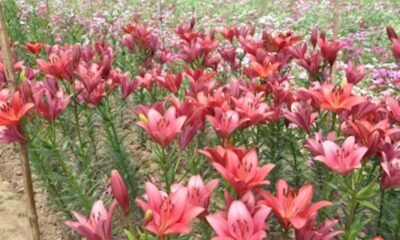


Blossom at Risk | Climate Change and Its Impact on Floriculture
-




SMHS incident: When hope turns to rage
-




RBI penalises Central Cooperative Banks Baramulla, Anantnag for violations
-




Editorial | J&K Budget 2025-26 – A Balancing Act
-




Building FPO Leaders: SKUAST-K, MANAGE Hyderabad complete trainers’ training
-




CII J&K Organizes Health Conclave 2024
AgriBiz
Blossom at Risk | Climate Change and Its Impact on Floriculture
Published
6 months agoon
July 30, 2025By
BK Editor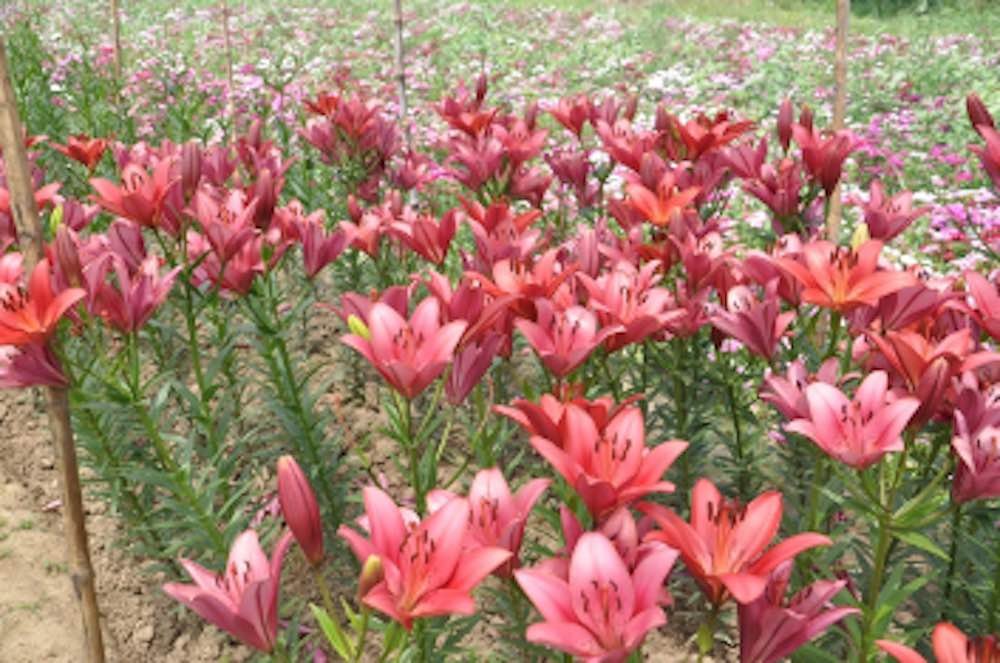

Dr Zahoor Ahmed Rather
Prof Imtiyaz Tahir Nazki
Blossom at Risk
The global environmental agencies declared 2024 the hottest year and over the course of the last century, the average surface temperature of earth has increased, amounting to around 0.74 0C.As per the Economic Survey, India is the seventh most vulnerable country to climate change and faced severe weather extremes, with 93% of days in 2024 marked by extreme climate events such as heatwaves, cyclones, and floods. As the world grapples with the phenomenon of climate change, one of the most visually striking yet often overlooked casualties is the floriculture industry. From tulips in the Netherlands to roses in Kenya, the delicate balance required for flower cultivation is being disrupted by rising temperatures, erratic weather patterns, and shifting ecosystems. The floriculture industry employs millions of people, from small-scale farmers in developing countries to large-scale exporters in Europe and Asia. The decline in flower quality and quantity due to climate change could have far-reaching consequences not only affecting global flower supplies but also small-scale flower growers, being the backbone of this industry, and may be forced out of business. At present, 1191 growers registered with Department of Floriculture (J&K) are active in commercial floriculture business generating an income of Rs. 19.42 crores (2023-24) which is under threat due to climate change.
The Kashmir’s temperate climate, fertile soil, and glacial waters have nurtured a flourishing floriculture industry with an area of about 431.25 ha alone under gardens, parks and lawns, attracting tourists all over world. Kashmir once celebrated as the “Garden of Eden” for its riot of colors and fragrances, isnow slowly turning into a battleground where nature and climate change are stuck in a grim struggle. Extreme weather events, like unseasonal frosts, irregular precipitation patterns, prolonged droughts and increased evaporation rates are becoming more frequent. One of the immediate consequences of climate change in Kashmir is the disruption of traditional weather cycles.
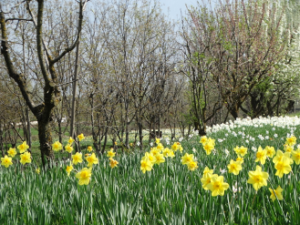

The most significant impacts of climate change are the alteration of crop blooming cycles. A shorter blooming season, improper floral growth and colour development, and insufficient flowering are all problems associated with commercial flower cultivation, especially under open field conditions. Thus flower crops like tulip, marigold, gladiolus, annuals grown under open conditions will be greatly affected by these erratic weather changes. Among ornamental crops, flowering bulbs are considered as vital indicators of climate change due to their sensitivity to minor seasonal cues and temperature changes. Warmer temperatures are causing flowers to bloom earlier than usual, disrupting supply chains and affecting seasonal markets. Spring flowering bulbs viz., tulips, daffodils and crocuses are among the first plants to signal the onset of spring, have been observed blooming earlier than historical averages. Warmer winters have caused premature bud formation making them highly susceptible to unexpected frost. Ornamentals such as tulips, daffodils, magnolia, irises which need chilling temperature for flowering are adversely affected. Under present scenario of mild winter and warm spring, the bulb yield oftulip is expected to hit badly. On the other hand, summers, with prolonged unexpected heat waves have also disruptedthe normal blooming process of flowers. These conditions lead to shortening of flower duration and deterioration of aesthetic and commercial value.
Temperature extremes not only influence the timing and quantity of flowering but also affect flower quality including volatile fragrances of flowers. Temperature at low to medium range plays a critical role in pigment production especially anthocyanin which contributes to the vibrant colours of flowers. The extreme temperature has also been linked to declining number of flowering buds and smaller flower diameters in species like Antirrhinum majus and Impatiens walleriana. Any unusual change in photoperiodism and thermoperiodism due to climate change would result in a significant deviation in the flowering patterns of plants such as carnations, chrysanthemums, and poinsettias.
The plant hardiness zones have also been observed to move northward or upwards in response to rising temperatures. Diversity of some alpine species has become vulnerable and their distribution is gradually narrowed. The rhododendrons and other woody ornamentals of lower hills have begun to invade the alpine areas thus changing the composition of plant population. Changes in the timing, duration, and abundance of flowering have the potential to disrupt ecological relationships among plants, pollinators, herbivores, flower parasites and pathogens.
Rising temperatures, altered precipitation patterns and increased humidity create favourable conditions for outbreak of pests and diseases by expending habitat range that can cause damage to ornamental plants at high scale. This can pose a significant challenge to sustain quality production in floriculture, thus requiring integrated approaches to devise management strategies.
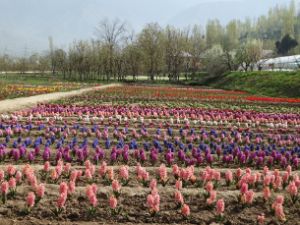

The plight of Kashmir’s floriculture is a microcosm of the global climate crisis. Despite the challenges, the floriculture industry has to adopt innovative approaches to combat climate change. Farmers can take up greenhouse cultivation to have better control of temperature and humidity and drought-resistant flower crops along with precision farming practices like drip irrigation etc. The modern approaches like roof and vertical gardening can play an important role in improving air quality, and reducing surface temperature in the built environment, costs for heating or cooling of building and noise pollution. Interior landscape plants are also useful to enhance indoor environmental quality and improve workplace efficiency. Development of public parks and lawns enriched with native flora improves air quality, mitigate health risk and maintain species diversity. The AI-powered systems can also be used to monitor and optimize the growing conditions of high value crops. Therefore, the future of Kashmir’s floriculture depends on collaborative efforts across all sectors. Policymakers, researchers, and industry leaders must join their hands to work together to execute policies and practices that promote sustainability and protection of the region’s floral heritage and tourism industry associated with it.
The authors are faculty at SKUAST-K’s Division of Floriculture and Landscape, Shalimar. zahoor.rthr@gmail.com
Opinion
Ethical Consumerism And Organic Market Nexus
Published
6 months agoon
July 26, 2025By
BK Editor

Dr Binish Qadri
Malik Daniyal Shabir
The choices consumers make today are no longer limited to price and utility. Increasingly, purchasing decisions are being shaped by deeper concerns—about the environment, labour ethics, health, and long-term sustainability. This shift in consumer consciousness has brought ethical consumerism to the forefront of economic and social discussions. Ethical consumerism, at its core, is a form of activism. It transforms everyday market behaviour into a statement of values, where individuals engage with the marketplace not just as buyers, but as participants in shaping a more equitable and sustainable world.
One area where the impact of ethical consumerism is especially visible is the organic market. Organic food is not just about pesticide-free vegetables or hormone-free milk; it represents a broader commitment to a way of life that values nature, fairness, and health. The rise of the organic market is not merely a trend, but a response to a collective moral impulse—one that sees food as a gateway to better living for individuals and communities alike.
Ethical consumerism is not an entirely new phenomenon. It can be traced back to movements like boycotts of slave-produced sugar in the 18th century and, later, fair-trade campaigns in the 20th century. As globalisation expanded markets, it also exposed consumers to the darker side of production—sweatshops, deforestation, animal cruelty, and chemical abuse. Simultaneously, the organic farming movement took root, driven by concerns over synthetic fertilisers, pesticides, and declining soil health. What began as a fringe movement soon gained traction with the rise of environmental activism and public health awareness. In India, government recognition and consumer interest have boosted organic farming policies and local organic brands. Together, these developments forged a shared moral and ecological ground between ethical consumerism and the organic movement.
Organic food is not just about pesticide-free vegetables or hormone-free milk; it represents a broader commitment to a way of life that values nature, fairness, and health. The rise of the organic market is not merely a trend, but a response to a collective moral impulse—one that sees food as a gateway to better living for individuals and communities alike.
Health has long been a personal concern, but in recent years it has also taken on moral dimensions. The link between food choices and long-term well-being is clearer than ever, and consumers are beginning to view the act of buying food as an ethical choice. Rising rates of lifestyle diseases, antibiotic resistance, and food adulteration have forced many to question conventional agricultural systems. Organic food offers an alternative that aligns with both personal and societal health goals. Choosing food grown without harmful chemicals becomes not just a self-protective act but a gesture of solidarity toward a cleaner environment and a healthier community. In this light, the push for organic food becomes not merely a dietary decision but a reflection of a broader ethical framework.
There is a complementarity between ethical consumerism and the organic market. Both affect and get affected by each other. The consumption of organic food has moral considerations, such as health and social concerns including the environment and sustainability. Agricultural economics is witnessing a rising trend and craze for organic food, which is visible in the shift in the consumer taste and demand towards organic food. The mounting health issues among general population, especially among young folks are pressing hard for development of the organic market. Consumers are the king of the market who increasingly see organic food as a way to support eco-friendly or sustainable farming practices, safeguard the environment, and avoid chemicals linked to traditional farming.
As far as ethical consumers are concerned, they are often inspired by concerns about environmental impact, human rights, human freedom, and animal welfare, which coincides with the organic farming canons. In other words, they are bothered about the holistic socio-environmental and animal welfare outcomes of their purchasing power decisions. They give importance to the goods that are in accordance with their ethics and moral values, including environmental sustainability and objective labour activities. This contains refraining from goods from firms with a bad reputation or buying from firms displaying moral conduct right from scratch. They pay a pivotal role in promoting sustainable development, meeting needs of the present generation without compromising the needs of the future generations. They provide backup to ethical trade and commerce. They give top priority to companies with a great ethical background and sustainability principles, giving a clear-cut message that moral values are above all. Moreover, they stimulate demand for sustainable goods. They prefer fair-trade goods, organic food, and sustainable goods, and accordingly, create a demand for sustainable substitutes, promoting innovations (especially green innovation) and produce sustainable and green goods. The moment they do away with those companies that promote unethical and unsustainable practices, they basically drive a long path towards sustainable development. It has a dual effect: On one hand, it restricts child labour and immoral labour practices and on the another hand, it reduces environmental degradation. Furthermore, ethical consumers can promote environmental responsibility by raising awareness about social and environmental issues. They always prefer well-informed choices, thereby empowering consumers in every possible manner. By making informed choices, they be held personally responsible for their actions impact on the social systems and environment.
In states like Sikkim, which declared itself fully organic in 2016, consumer support and political will came together to build an ecosystem that values soil health, farmer welfare, and chemical-free produce. Farmer cooperatives and weekend organic markets in cities like Bengaluru, Pune, and Delhi have become popular precisely because they appeal to a consumer base that wants its spending to reflect its values. These cases show that ethical consumption is more than a concept—it is a living force with the power to transform how food is grown and consumed.
Across the globe and within India, the convergence of ethical values and organic preferences is reshaping markets. Brands like Organic India and 24 Mantra Organic owe much of their success to ethically conscious consumers who demand transparency, sustainability, and purity. In states like Sikkim, which declared itself fully organic in 2016, consumer support and political will came together to build an ecosystem that values soil health, farmer welfare, and chemical-free produce. Farmer cooperatives and weekend organic markets in cities like Bengaluru, Pune, and Delhi have become popular precisely because they appeal to a consumer base that wants its spending to reflect its values. In states like Sikkim, which declared itself fully organic in 2016, consumer support and political will came together to build an ecosystem that values soil health, farmer welfare, and chemical-free produce. Farmer cooperatives and weekend organic markets in cities like Bengaluru, Pune, and Delhi have become popular precisely because they appeal to a consumer base that wants its spending to reflect its values. These cases show that ethical consumption is more than a concept—it is a living force with the power to transform how food is grown and consumed.
While the growth of ethical consumerism and the organic market is promising, it is not without obstacles. One major challenge is greenwashing—where companies falsely advertise their products as ethical or organic, misleading well-meaning consumers. There is also a cost barrier: organic and ethically produced goods are often more expensive, making them inaccessible to a large section of the population. Certification standards vary, and not all organic products undergo rigorous verification, creating confusion and mistrust. Moreover, the effectiveness of ethical consumerism hinges on access to information. In many regions, consumers lack the knowledge or tools to make informed choices, limiting the reach of these movements. These challenges must be addressed to sustain momentum and ensure that ethical consumerism remains a genuine force for good.
The relationship between ethical consumerism and the organic market is not incidental—it is deeply rooted in shared values and mutual influence. Ethical consumers drive demand for organic products, while the organic market offers them a platform to express their values through everyday choices. Together, they form a powerful nexus capable of reshaping economies, societies, and ecosystems. To deepen this impact, there is a need for stronger regulations, better consumer education, and more inclusive pricing strategies. Only then can this movement become not just the preference of a few but a sustainable norm for the many.
Dr Binish Qadri is former Assistant professor, Cluster University Srinagar and Malik Daniyal Shabir is an undergraduate student at the University of Delhi. They can be reached at qadribinish@gmail.com
Editorial
SMHS incident: When hope turns to rage
Published
6 months agoon
July 24, 2025By
BK Editor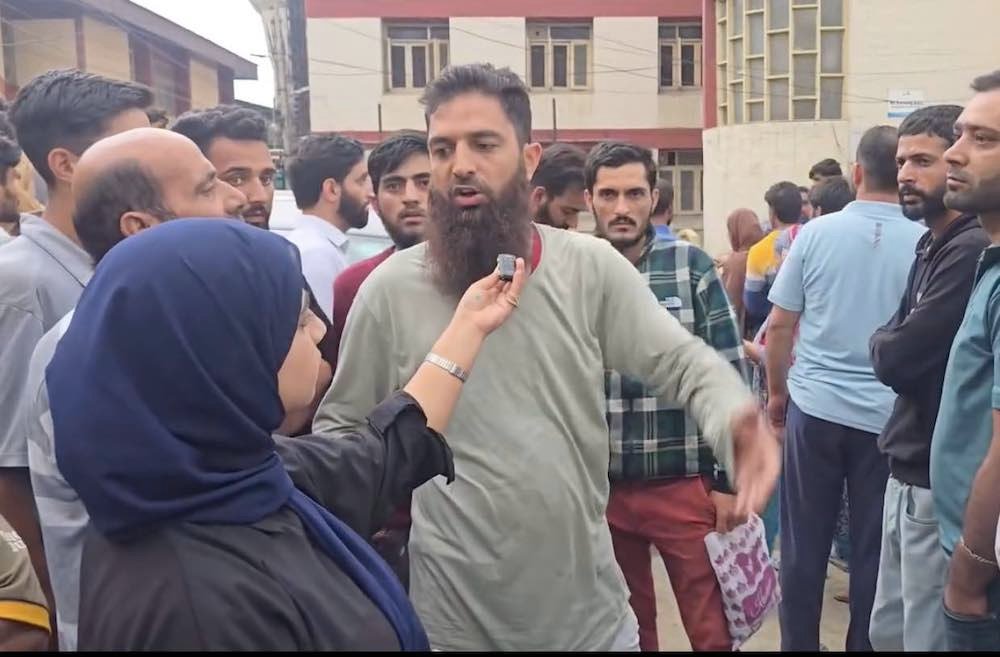

The incident at SMHS Hospital, where an attendant assaulted a doctor after their patient reportedly died due to neglect, highlights a deeply troubling and complex issue within our healthcare system. While any act of violence is unequivocally unacceptable, this event serves as a stark reminder of the underlying frustrations and systemic failures that often lead to such desperate outbursts.
The core of the problem lies in the perceived lack of empathy and adequate care provided by medical professionals, particularly during critical situations. For doctors, dealing with illness and death may become a routine, a part of their daily professional lives. However, for a patient and their family, a critical illness is a life-altering, highly emotional, and often terrifying experience. The disconnect between these two realities is profound. When a patient, who has come to the hospital as a last resort, feels unheard, neglected, or that their loved one is not receiving the attention they desperately need, the sense of helplessness can quickly turn into anger and despair.
The situation in emergency wards across major city hospitals like SKIMS, SMHS, Bone & Joint, and Lal Ded is indeed dire. Overcrowding, coupled with a severe shortage of senior doctors and specialists, places an immense burden on the few junior doctors who are often left to manage a deluge of critical cases. This not only compromises the quality of care but also contributes to the stress and burnout among the medical staff, potentially leading to the very behaviour that patients and attendants find so distressing. Work pressure, long hours, and inadequate resources are often cited as reasons for a lack of bedside manner, but these reasons, while understandable to an extent, do not alleviate the suffering of those seeking help.
It is abundantly clear that a fundamental shift is desperately needed in how our hospitals, particularly emergency and critical care units, operate. The government must initiate a comprehensive re-evaluation and overhaul of the entire system. This overhaul is not merely a suggestion; it is an urgent imperative.
The core of the problem lies in the perceived lack of empathy and adequate care provided by medical professionals, particularly during critical situations. For doctors, dealing with illness and death may become a routine, a part of their daily professional lives. However, for a patient and their family, a critical illness is a life-altering, highly emotional, and often terrifying experience. The disconnect between these two realities is profound. When a patient, who has come to the hospital as a last resort, feels unheard, neglected, or that their loved one is not receiving the attention they desperately need, the sense of helplessness can quickly turn into anger and despair.
A significant increase in staffing is non-negotiable. We need more doctors, nurses, and support staff, especially in emergency departments, to ease the crushing workload and ensure that medical professionals can dedicate the necessary time and attention to each patient.
The constant presence of senior doctors and specialists in emergency and critical care units is paramount. Their invaluable experience and expertise are crucial for accurate diagnoses, timely interventions, and effective management of complex cases that junior doctors alone cannot always handle.
Furthermore, beyond medical proficiency, there is an urgent need for improved training in patient communication and empathy for all hospital staff. This includes equipping them with skills to convey information clearly, manage expectations compassionately, and demonstrate genuine concern, even amidst the most chaotic situations.
Addressing the pervasive overcrowding demands an upgrade in infrastructure and equitable resource allocation. This means more beds, modern equipment, and better-organised waiting areas. Resources must be strategically distributed to ensure that all necessary tools and medications are readily available when lives hang in the balance.
Establishing clear and accessible grievance redressal mechanisms is crucial. Patients and their attendants need effective channels to voice their concerns without fear. A robust system for addressing complaints proactively can prevent frustrations from escalating into unfortunate incidents like the one witnessed at SMHS.
Finally, while supporting our medical community, there must also be a culture of accountability. Instances of negligence and unprofessional conduct must be addressed appropriately to rebuild and maintain the vital trust between the medical fraternity and the public it serves.
The recent incident at SMHS Hospital is a symptom of a much larger systemic illness. It is a distress signal that demands immediate and comprehensive action. Patients come to hospitals with hope, seeking solace and healing. It is the government’s responsibility to ensure that this hope is met with professional care, empathy, and a system that prioritizes human life above all else. Failing to do so will only perpetuate a cycle of frustration, anger, and further erosion of public trust in our healthcare institutions.


Blossom at Risk | Climate Change and Its Impact on Floriculture


Ethical Consumerism And Organic Market Nexus


SMHS incident: When hope turns to rage


RBI penalises Central Cooperative Banks Baramulla, Anantnag for violations


Editorial | J&K Budget 2025-26 – A Balancing Act


Building FPO Leaders: SKUAST-K, MANAGE Hyderabad complete trainers’ training


CII J&K Organizes Health Conclave 2024


SKUAST-K to hold mega Science Summit on Aug 23-24


Haryana Biodiversity Board commemorates International Biodiversity Day at GNK Group Of Institutions


Kya kuchh tha jiske kehne ko: A tribute to father
Trending
-

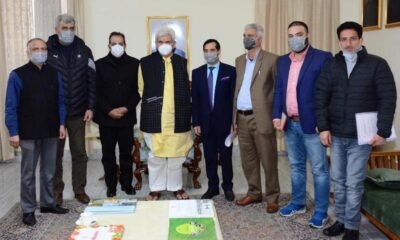

 Industry5 years ago
Industry5 years agoFCIK hails LG Sinha for creating entrepreneur-friendly industrial ecosystem
-



 Economy3 years ago
Economy3 years agoGlobal eCommerce boom and local traders of Kashmir
-

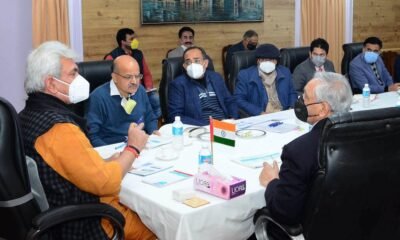

 Energy5 years ago
Energy5 years agoLt Governor discusses J&K power scenario with experts
-

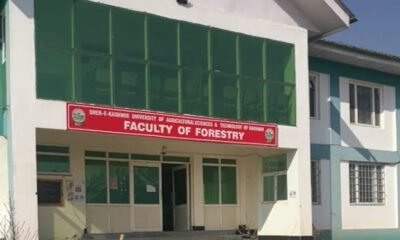

 Infra5 years ago
Infra5 years agoSKUAST-K bags EU project for urban green infrastructure
-

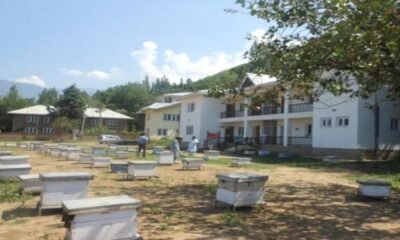

 AgriBiz5 years ago
AgriBiz5 years agoSKUAST-K to set up 3 honey testing labs in Kashmir
-



 Review5 years ago
Review5 years agoScam 1992: Story of the Big Bull of Share Market
-

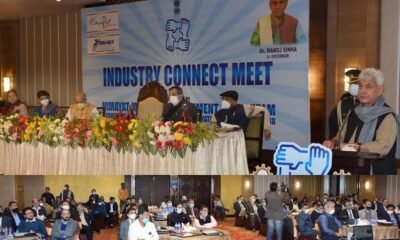

 Jobs5 years ago
Jobs5 years agoJ&K Govt holds Industry Connect Meet-Himayat 2020
-

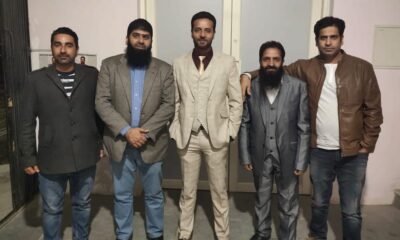

 Industry5 years ago
Industry5 years agoImran Murtaza takes oath as president Industrial Association Khunmoh

